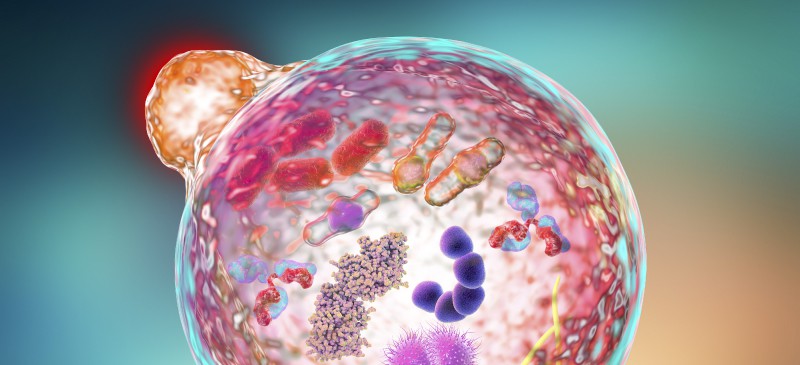Benefits of Autophagy, Plus How to Induce It
Even in a healthy human body, cells are constantly becoming damaged as a normal part of metabolic processes. However, as we age, experience stress, and deal with more and more free radical damage, our cells become damaged at an increased rate.
This is where autophagy comes in: It helps to clear damaged cells from the body, including senescent cells that serve no functional purpose but still linger inside tissues and organs. The reason it’s so important to remove senescent and damaged cells is because they can trigger inflammatory pathways and contribute to various diseases.
The word ‘autophagy’ was coined more than four decades ago and is derived from the Greek words “auto” (meaning self) and “phagy” (meaning eating). Only very recently in animal studies have researchers have been able to observe how autophagy can promote longevity and benefit the nervous system, immune system, heart and metabolism.
Autophagy is one of the most important breakthroughs in the science of aging. While scientists have known about this process since the 1950s, only in the past decade have we been able to see the effects of activating autophagy to improve cellular health.
As you’ll learn more about below, the best way to induce autophagy is through practicing fasting.
What Is Autophagy?
The definition of autophagy is “consumption of the body’s own tissue as a metabolic process occurring in starvation and certain diseases.” Researchers believe that autophagy is a survival mechanism, or a way that the body cleverly responds to stress in order to protect itself.
Is autophagy good or bad for your health? It’s definitely good! As mentioned above, you can think of autophagy as a form of “self-eating,” which might sound pretty scary but is actually your body’s normal way of carrying out cellular renewal processes. In fact, autophagy is so beneficial that it’s now being called a “key in preventing diseases such as cancer, neurodegeneration, cardiomyopathy, diabetes, liver disease, autoimmune diseases and infections.”
Thanks to recent studies, we now know that autophagy is important for “cleaning up” the body and defending against the negative effects of stress. However, scientists still emphasize that the exact way that autophagy processes work are just beginning to be understood.
What Are The True Benefits Of Autophagy?
Activation of autophagy counteracts the age-associated accumulation of damaged cellular components and enhances the metabolic efficiency of cells.
Autophagy is a response to stress that helps cells to become more resilient and conservative with their energy.
The process of autophagy is also able remove certain dysfunctional mitochondria that degrade the cell.
Complexion and skin integrity are also improved through autophagy.
Disruptions to autophagic processes have been associated with increased risk for some psychiatric conditions. Typical functioning of autophagy provides protection against the development of psychiatric disorders.
Many neurodegenerative disorders stem from the accumulation of deformed proteins in and around neurons, inducing gradual brain cell death and subsequent loss of mental faculties. Autophagy removes these proteins.
Autophagy supports the immune system in fighting infectious diseases by
- Direct removal of microbes from inside of cells
- Removal of toxins created by infections
- Modulation of the immune response to infections
Autophagy can both increase and decrease inflammation responses within the body.
It increases inflammation by presenting evidence of pathogen invasion and turning on the immune response.
Autophagy then decreases the inflammation brought about by an immune response by clearing the cell of antigens that are stimulating the response.
This has great implications for the mitigation of the inflammatory response resulting in many current chronic conditions including insulin resistance, diabetes, heart disease and obesity.
Exercise is a stressor causing cellular energy usage to goes up resulting in components getting worn out faster.
Autophagy is increased in response to this in order to maintain energy balance and more efficiently recycle existing and degraded energy molecules.
Autophagy suppresses systems and processes that can be related to the development of cancer, such as chronic inflammation and damaged DNA.
However, cancer cells can hijack the process of autophagy and use it to their advantage to become resistant to treatment. In later stages of cancer, as tumors begin to take over cells, autophagy is induced due to the stress of nutrient deprivation and energy depletion. Further research is needed since currently there is no way to measure the level of autophagy in humans when it comes to this area.
Activating Autophagy
There are several ways you can turn up your body’s autophagy process
Aerobic exercise has been shown to induce autophagy in muscle tissues and the brain.
Not only does exercising make you feel and look good, it activates autophagy to ensure your cells fully recover from the process.
A lack of nutrients activates autophagy to increase the recycling of cellular components, ensuring cells continue to properly function with less requirement from external resources. This can be achieved either fasting reducing the amount of food you eat.
Short-term fasting induces profound neuronal autophagy and may be a good method for combating neurological conditions.
The reduction in carbohydrate intake and the shift away from glucose as the predominant fuel source mimics the process that occurs during fasting and can lead to the increase of autophagy.
Ketogenic diets are particularly effective at promoting autophagy in the brain.
Adequate restful sleep is important for stimulating autophagy. The circadian rhythm not only helps control your sleep cycle, but it is also linked to autophagy. Your biological clock affects the rhythm of autophagy.
Vitamin D is obtained through diet and supplements and is synthesized in the skin upon exposure to sunlight. It has been shown to induce autophagy and potentially play a role in protecting pancreatic cells, providing a possible avenue for diabetes therapeutics.
Precautions
There’s still a lot we have to learn about autophagy and how to best induce it. Beginning to induce autophagy by incorporating fasting and regular exercise into your routine is a great place to start.
However, if you are taking certain medications to control any health conditions, it’s best to consult your doctor about introducing fasting. People who suffer from hypoglycemia or diabetes, and women who are pregnant or breastfeeding, should not fast. Anyone being treated for a disease like cancer should always discuss treatment options wand interventions with their doctor.
Final Thoughts
- Autophagy translates to “self-eating.” It’s a beneficial process that describes consumption and recycling of the body’s own tissue as a metabolic process.
- Researchers believe that autophagy is a survival mechanism that has anti-aging benefits. It helps cleanse waste from the body, provides energy and potentially fights cancer, neurodegenerative disease and other chronic illnesses.
- Autophagy is induced through starvation, fasting and other “stressors.” You can increase autophagic processes by doing some type intermittent or alternate day fasting, exercising and/or following the ketogenic diet.




